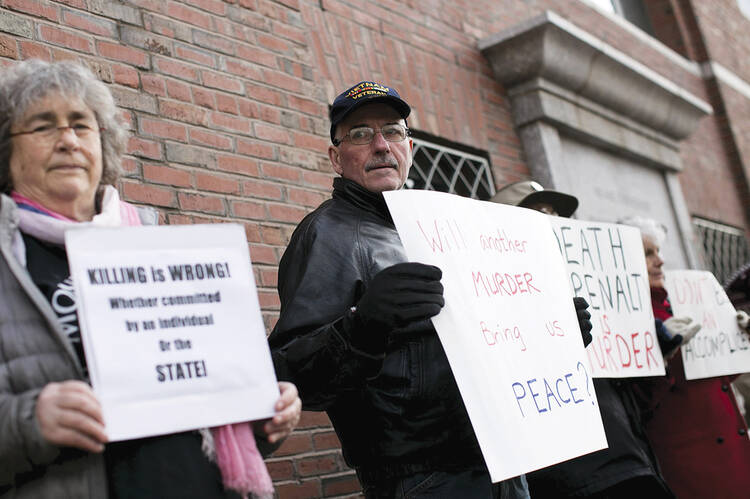It was no surprise that Dzhokhar Tsarnaev was convicted on all 30 counts in the Boston Marathon bomber trial on April 8; in an opening statement, his attorneys had conceded his guilt in the April 2013 horror at the finish line. The State of Massachusetts bars the use of capital punishment, but Tsarnaev was tried in a federal court. Seventeen of the crimes he has been convicted of—which include the bomb attacks that claimed three lives and wounded 260 others, and the murder of a police officer days later in a chaotic attempt to escape the city—are eligible for capital punishment.
The jury that convicted Tsarnaev will begin deliberations on April 13 to determine whether he will face execution or life behind bars, but Massachusetts Catholic bishops have already indicated where they stand on the matter. “The Church has taught that the cases in which the execution of the offender is an absolute necessity are ‘rare, if not practically nonexistent.’ The Church’s teaching is further developing in recognition of the inherent dignity of all life as a gift from God,” the state’s bishops, including Boston’s Cardinal Seán P. O’Malley, O.F.M.Cap., wrote in a statement released on April 6.
The statement concludes: “The defendant in this case has been neutralized and will never again have the ability to cause harm. Because of this, we…believe that society can do better than the death penalty.”
The Massachusetts bishops’ rejection of the use of capital punishment follows a recent line of public statements from Catholic global and national leaders moving the church further from the notion that the death penalty is ever an appropriate punishment in a free society. On March 20 Pope Francis bluntly denounced capital punishment as “unacceptable,” no matter how serious the crime of the condemned. He called capital punishment “cruel, inhumane and degrading.”
In a statement released on March 31, 400 Catholic and other Christian leaders denounced the use of capital punishment in the United States. “Torture and execution is always a profound evil, made even more abhorrent when sanctioned by the government in the name of justice when other means of protecting society are available,” the statement read. “All who reverence the sanctity of human life, created in the image of God, must never remain silent when firing squads, lethal injections, electric chairs and other instruments of death are viewed as morally acceptable.”
The reinstatement of firing squads in Utah was quickly condemned by that state’s lone Catholic bishop. The legislators “argue that, because executions are lawful, they are then moral. This is not so,” said Bishop John C. Wester of Salt Lake City in a statement on March 24 .
“No human law can trump God’s law,” Bishop Wester said. “Taking a human life is wrong, a slap in the face of hope and a blasphemous attempt to assume divine attributes that we humble human beings do not have.”
It has been almost 70 years since the last execution took place in Massachusetts, and 18 years since its state legislature was one vote away from restoring the death penalty after public outcry over the murder of a 10-year-old Cambridge boy. Though 55 percent of Americans, according to a 2013 Pew study, say they support the death penalty—including 59 percent of white Catholics—that is a sharp decline from a high of 78 percent who supported it in 1996.
Across the United States enthusiasm for the use of the death penalty has diminished as “humane” methods of execution repeatedly fail and miscarriages of justice accumulate. If the members of the Tsarnaev jury conclude they cannot apply the death penalty—even in this heinous crime—it could be another signal that this peculiar criminal justice institution in the United States may be reaching a historic end.








